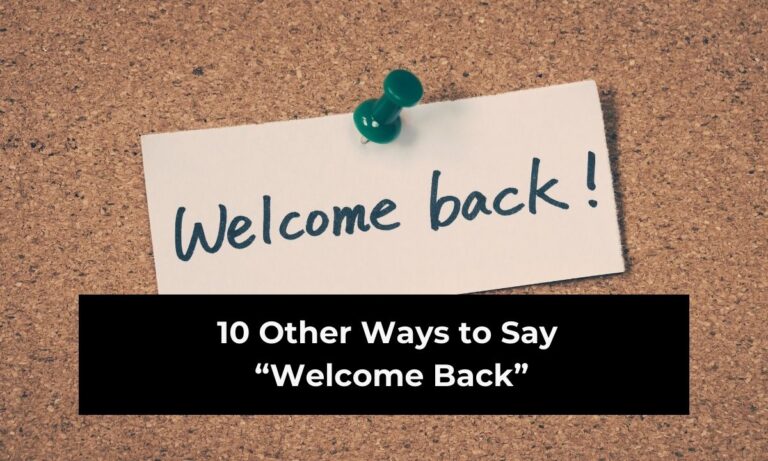We’ve all been there — you’re talking to someone who’s feeling rushed, overwhelmed, or anxious about finishing something quickly. You want to reassure them, to let them know they don’t have to hurry. But saying “Take your time” over and over can feel repetitive.
That’s where variety comes in. Using different phrases to express patience not only makes you sound more thoughtful, but it also helps you adapt to the situation. Some moments call for warmth and comfort. Others need a more professional tone. And sometimes, you just want to keep things casual.

In this article, you’ll discover 12 creative alternatives to “Take your time.” These phrases work in everyday conversations, professional settings, and even in writing. They’ll help you sound more empathetic, supportive, and understanding — without falling into the same predictable wording.
You’ll also see examples for each one, so you can instantly use them in your own conversations. Whether you’re calming a stressed friend, emailing a client, or encouraging a loved one, you’ll find just the right words to show that you’re patient and considerate.
The best part? These phrases aren’t just about telling someone they can go at their own pace. They also send a deeper message: “I value you, and I’m not pressuring you.” That’s something we all appreciate hearing, especially in a busy world where everyone seems to be in a hurry.
Must Read:
- Other Ways to Say “Talk to You Then”
- Other Ways to Say “Stay Tuned”
- Other Ways to Say “As You Can See”
So let’s dive in and explore fresh, thoughtful ways to say “Take your time” — and make your conversations more meaningful.
1. No Rush
Sometimes, the simplest words carry the most comfort. Saying “No rush” immediately takes the pressure off and lets the other person know they have space to breathe.
This phrase works beautifully in both personal and professional settings. If you’re emailing a colleague who’s juggling multiple projects, “No rush” tells them their task isn’t urgent. If you’re talking to a friend deciding what to order at a restaurant, it shows you’re happy to wait.
You can also pair it with a friendly tone to make it sound even more genuine. For example:
- “Take your time — no rush at all.”
- “Whenever you’re ready. No rush.”
The key here is sincerity. If you actually need something urgently, don’t use this phrase. But when you truly mean that the other person can go at their pace, “No rush” is short, sweet, and reassuring.
It’s especially powerful in text messages, where brevity is appreciated. Instead of typing a long explanation, “No rush” conveys patience in just two words.
In moments when someone feels the weight of expectations, hearing “No rush” can help them relax, focus, and do their best work without unnecessary stress.
2. Whenever You’re Ready
This phrase is gentle yet flexible, making it perfect for situations where you’re happy to wait.
When you say “Whenever you’re ready,” you’re telling the other person that they control the pace. You’re not setting a deadline. You’re not hinting that they should hurry. You’re simply giving them the freedom to decide when they’re ready to proceed.
For example, you might say to a client:
- “We can start the meeting whenever you’re ready.”
Or to a friend: - “We’ll head out whenever you’re ready.”
It works especially well in conversations where the other person might be preparing something — like gathering their thoughts, finishing a task, or making a choice. The phrase acknowledges that readiness isn’t just about time; it’s also about mental and emotional preparedness.
“Whenever you’re ready” is also adaptable. You can make it warmer by adding their name:
- “Whenever you’re ready, Sarah.”
It’s polite, supportive, and keeps the atmosphere relaxed, whether in everyday life or formal settings.
3. There’s No Hurry
“There’s no hurry” is a softer, more reassuring version of “No rush.” It works well when you want to show that time really isn’t a concern at the moment.
This phrase is ideal when someone feels guilty for making you wait. For instance:
- “Sorry, I’m running a little late.”
- “That’s okay, there’s no hurry.”
It’s also a great phrase for situations where quality matters more than speed. Maybe you’re waiting for a graphic designer to finish a project. Letting them know “There’s no hurry” can reduce stress and encourage thoughtful, high-quality work.
In friendships, this phrase shows patience and kindness. If someone’s telling a story and needs a moment to recall details, saying “There’s no hurry” gives them room to think without feeling rushed.
When you use this phrase, your tone matters. A warm, genuine delivery ensures it doesn’t sound dismissive. It’s about giving someone peace of mind while they work or decide at their own pace.
4. No Pressure
“No pressure” is a friendly and non-intimidating way to let someone know they can take their time. It also removes the feeling of expectation or obligation, which can be very freeing.
This phrase is particularly helpful in situations involving decisions. If you’re offering someone a choice — like joining you for an event or trying something new — “No pressure” keeps the invitation open without making them feel cornered.
For example:
- “If you want to join us, great! No pressure.”
- “Take as long as you need to decide. No pressure.”
It works in personal and professional conversations, but be mindful of your tone. If said sarcastically, it can mean the opposite. Keep it sincere, and it will come across as caring and understanding.
In group settings, “No pressure” can also prevent embarrassment. If someone isn’t ready to speak up or participate, you’re letting them know it’s perfectly fine.
This phrase is all about removing the weight of expectation and giving someone the emotional space to act when they feel ready.
5. At Your Own Pace
This is a wonderful alternative when you want to emphasize that speed isn’t important — what matters is comfort and accuracy.
“At your own pace” is especially useful when someone is learning something new. Whether it’s a new employee in training or a child practicing a skill, this phrase tells them it’s okay to move slowly and carefully.
Example:
- “Feel free to work through this at your own pace.”
- “Take the class at your own pace and ask questions anytime.”
It’s also a great way to encourage self-confidence. By allowing someone to set their pace, you’re showing that you trust them to manage their time and process information in the way that works best for them.
In a fast-moving world, hearing “At your own pace” is a refreshing reminder that not everything needs to be rushed. It fosters focus, reduces anxiety, and often leads to better results.
6. No Need to Hurry
When you say “No need to hurry,” you’re letting someone know that urgency isn’t necessary — and that you value the process over the speed.
It’s ideal for moments when the other person might feel the urge to rush because they think you’re waiting impatiently. This phrase calms that worry.
For example:
- “Finish your lunch; no need to hurry.”
- “No need to hurry — I’m enjoying the view.”
The beauty of this phrase is its versatility. It can be casual and friendly in personal settings or professional and polite in work-related situations.
It’s a gentle way of reminding someone that they don’t need to push themselves unnecessarily, which can improve both mood and productivity.
7. Take All the Time You Need
This phrase is perfect when you want to give someone unlimited space to complete a task or make a decision.
It’s a strong statement of patience and support. For example:
- “Take all the time you need to think it over.”
- “Take all the time you need — we’ll be here.”
It works well when someone’s dealing with something important, like a tough decision, creative work, or an emotional situation. It assures them that you won’t be rushing them, no matter how long it takes.
However, because it’s such a generous offer, it’s best used when you genuinely have no time constraints. Saying it when you’re actually in a hurry can lead to frustration.
8. Don’t Feel Rushed
This phrase directly addresses the feeling you’re trying to prevent: the stress of being rushed.
It’s ideal for moments when someone might already be anxious or pressed for time. Saying “Don’t feel rushed” can help them slow down mentally, even if they’re in a fast-paced environment.
Examples:
- “Don’t feel rushed — we can wait.”
- “Don’t feel rushed; just focus on what you’re doing.”
It’s especially comforting in situations like interviews, tests, or presentations, where performance anxiety can be high. By reminding someone not to feel rushed, you’re helping them concentrate and perform better.
9. It Can Wait
“It can wait” is a reassuring phrase that tells someone the task isn’t urgent and can be handled later.
It’s perfect for moments when the person you’re speaking to is already busy. You’re letting them know their current priorities are more important, and they don’t need to drop everything for you.
Example:
- “If you’re busy, it can wait until tomorrow.”
- “Don’t worry about that now — it can wait.”
It’s a phrase that conveys understanding, respect for their time, and flexibility.
10. Whenever You Have a Moment
This is a polite, time-flexible phrase that works especially well in professional settings.
It tells the listener you’d like something done, but you’re leaving the timing up to them.
Example:
- “Whenever you have a moment, could you review this file?”
- “Please call me back whenever you have a moment.”
It’s respectful of their schedule and doesn’t demand immediate action, making it a great way to maintain good rapport.
11. When You’re Ready
“When you’re ready” is short, warm, and inviting.
It’s similar to “Whenever you’re ready” but feels slightly more direct. You’re letting them know the next step will happen when they’re prepared.
Example:
- “We can start the lesson when you’re ready.”
- “When you’re ready, we’ll head out.”
It works in casual and formal settings and conveys patience without overcomplicating things.
12. No Deadline
This phrase makes it clear that there’s no fixed time limit.
It’s best for projects, creative work, or situations where flexibility is key. By saying “No deadline,” you’re giving someone complete control over when they finish.
Example:
- “There’s no deadline, so feel free to take your time.”
- “Work on it whenever you can — no deadline.”
It’s a stress-reliever for anyone who works better without strict time pressure.
Conclusion
The words you choose can make a huge difference in how someone feels. Repeating “Take your time” works, but having more options lets you tailor your tone to the moment.
These 12 alternatives give you a versatile toolkit for showing patience and understanding — whether you’re talking to a friend, colleague, client, or loved one. Some are warm and casual, like “No rush.” Others are more professional, like “Whenever you have a moment.” All of them help remove pressure and make people feel respected.
In a fast-moving world, these small linguistic choices can have a big impact. They can help people feel valued, supported, and free to do their best work without anxiety. So the next time you want to encourage someone to slow down, try one of these alternatives. You might be surprised how much more relaxed — and productive — the conversation becomes.
FAQs
1. Why should I use alternatives to “Take your time”?
Using different phrases makes your communication more engaging, personal, and suited to different contexts.
2. Which phrase works best in a professional email?
“Whenever you have a moment” or “At your own pace” are polite and professional.
3. Can these phrases be used in formal writing?
Yes, many of them work well in professional contexts with the right tone.
4. Are these phrases interchangeable?
Some are interchangeable, but others work better in specific situations. Context matters.
5. How can I make these phrases sound genuine?
Always match your tone and timing to your true intentions. Only use them when you really mean there’s no rush.





